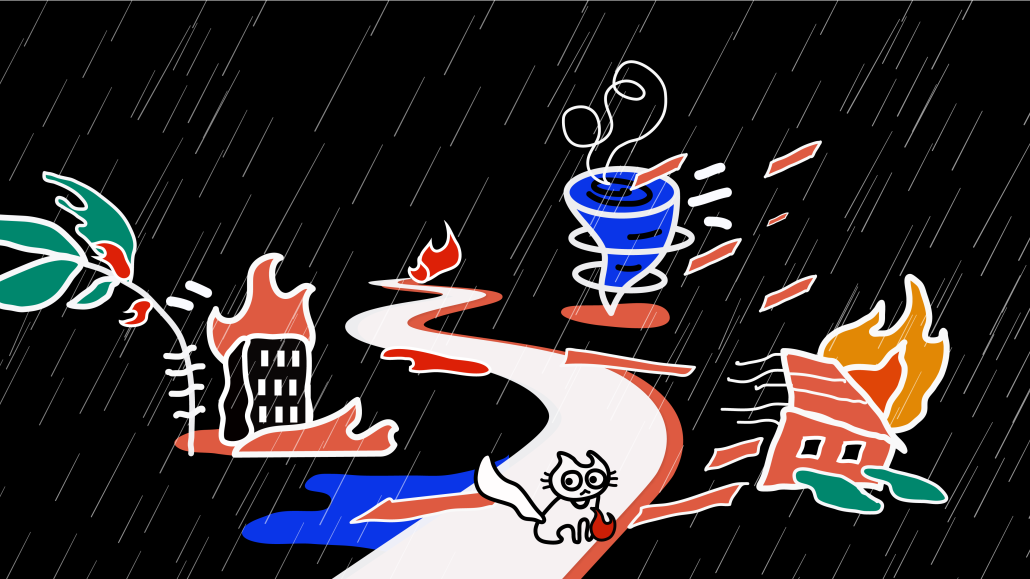Secure your place at the Digiday Media Buying Summit in Nashville, March 2-4
‘Consumers expect brands to act’: Why defining voice and values has become crucial for marketers amid crises

Throughout a tumultuous 2020 and early 2021, brands have paused, tweaked and even blocked social media advertising in response to the crises.
That’s not a new strategy as brands are often risk-averse. But as the veritable conga line of crises — from the coronavirus pandemic to the Black Lives Matter movement to the riot at the Capitol — hit last year, agency execs believe brands need a plan beyond simply pressing pause.
“In a world where consumers expect brands to act on their brand beliefs, hoping that your brand isn’t roped into a polarizing cultural conversation just won’t cut it,” said Nick Meyer, associate director social media strategy at Campbell Ewald..
Instead of hoping that a brand won’t be pulled into a crisis, marketers and agency execs need a clear idea of a brand’s position on key issues as well as a defined brand voice. Without that, simply pressing pause on paid social ads and staying silent can speak volumes. At the height of the Black Lives Matter movement last summer, for example, consumers pushed for brands to make a statement on the matter or risk a hit to their reputation.
Social media moves quickly and viral trends marketers often chase can be a flash in the pan. Planning that usually takes place over months now happens in just hours, according to Meyer. And it’s important to have a company-wide understanding of what the brand stands for to avoid tone-deaf, unauthentic posts.
“What would it mean for your customers to see you talking about your product when an issue your company claims to care about is dominating literally every single top trend in conversation,” said Valentina Bettiol, director, social strategy at 360i.
Last summer, amidst civil unrest and political polarization, many advertisers joined in a temporary boycott of Facebook. Those marketers hoped the platform would monitor hate speech in a more active way with plans to return in the fall. Since then, platforms like Twitter and Facebook have suspended Donald Trump as to not incite further violence similar to the riot at the Capitol. Still, social media can be a turbulent distribution channel, making for disrupted media plans.
Today, brands should be leveraging crisis in a meaningful way for long-term engagement, said Hooray Agency CEO Steven Seghers. Ad dollars that would have been used on buying paid social ads should be used to change, engage and develop an authentic communication strategy that’s emotionally-focused, he said.
And if the last few months have shown us nothing else, it’s the importance of having strong brand values, said Kay Pancheri, svp and group account director at MullenLowe U.S. It’s no longer about what you say, but what you do.
Pancheri offered one example in which one MullenLowe U.S. client, Boston-based Suffolk Construction, had its brand purpose centered around redefining possible. “[One client] stepped up to build emergency healthcare support in spaces you wouldn’t initially consider at the start of the pandemic,” Pancheri said.
It’s a move that could win brand loyalty. “Consumers will reward this level of scrutiny that goes beyond advertising to encompass external relationships and impact,” she said.
Still, for some brands, nothing will change. The aim is to stay neutral with ads that take place in a pre-politically polarized world that exists sans-Covid. And as far as Wongdoody CEO Ben Wiener is concerned, that’s okay.
“If you’re a brand that has a commitment to social change in your DNA and it’s authentic, great,” he said. “But I think the worst is when brands that don’t have any kind of authenticity try to become social commentators and that’s when it becomes cringey.”
Still, echoing other marketers, Wiener believes pressing pause and second guessing is no longer a sustainable approach to digital marketing. He cautions against brands being “reactive” because “there’s an endless number of things to react to.” Instead, Wiener believes that brands need to maintain consistency and have confidence with a clear brand voice and values.
Hooray Agency’s Seghers advises to “keep your gunpowder dry” in times of crisis and lean into brand values with authentic messaging. “At the end of the day, these [brands] have an expressed purpose and that expressed purpose is to connect with their customers in the way that they want to be connected to for commercial purposes,” he said.
More in Marketing

As it ramps up push to fund AI bets, Meta makes a new play for agencies
Even in the age of Advantage+, Meta needs agencies.

Zero-click reality is rewriting the rules of search for brands
Search performance concerns have reached brand boardrooms. Both organic and paid search practitioners are scrambling to find effective responses to the questions posed by AI developments.

Walmart Connect’s full-funnel ambitions come into focus, with Amazon in its sights
Walmart Connect is scaling quickly, with AI investments and the Vizio acquisition shaping its push to rival Amazon’s ad business.








